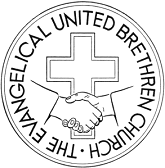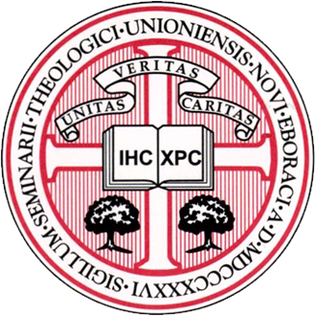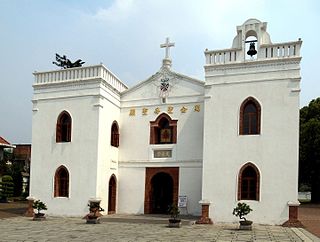Related Research Articles

The Evangelical United Brethren Church (EUB) was a North American Protestant denomination from 1946 to 1968 with Arminian theology, roots in the Mennonite and German Reformed, and communities, and close ties to Methodism. It was formed by the merger of the Evangelical Church and the Church of the United Brethren in Christ. The United Brethren and the Evangelical Association had considered merging off and on since the early 19th century because of their common emphasis on holiness and evangelism and their common German heritage. In 1968, the United States section of the EUB merged with the Methodist Church to form the United Methodist Church, while the Canadian section joined the United Church of Canada.

Religion in the United States began with the religions and spiritual practices of Native Americans. Later, religion also played a role in the founding of some colonies, as many colonists, such as the Puritans, came to escape religious persecution. Historians debate how much influence religion, specifically Christianity and more specifically Protestantism, had on the American Revolution. Many of the Founding Fathers were active in a local Protestant church; some of them had deist sentiments, such as Thomas Jefferson, Benjamin Franklin, and George Washington. Some researchers and authors have referred to the United States as a "Protestant nation" or "founded on Protestant principles," specifically emphasizing its Calvinist heritage. Others stress the secular character of the American Revolution and note the secular character of the nation's founding documents.

The mainline Protestant churches are a group of Protestant denominations in the United States and in some cases in Canada largely of the theologically liberal or theologically progressive persuasion that contrast in history and practice with the largely theologically conservative Evangelical, Fundamentalist, Charismatic, Confessional, Confessing Movement, historically Black church, and Global South Protestant denominations and congregations. Some make a distinction between "mainline" and "oldline", with the former referring only to denominational ties and the latter referring to church lineage, prestige and influence. However, this distinction has largely been lost to history and the terms are now nearly synonymous.

Union Theological Seminary in the City of New York (UTS) is a private ecumenical Christian liberal seminary in Morningside Heights, Manhattan, affiliated in Columbia University. Since 1928, the seminary has served as Columbia's constituent faculty of theology. In 1964, UTS also established an affiliation with the neighboring Jewish Theological Seminary of America. UTS confers the following degrees: Master of Divinity (MDiv), Master of Divinity & Social Work dual degree (MDSW), Master of Arts in religion (MAR), Master of Arts in Social Justice (MASJ), Master of Sacred Theology (STM), Doctor of Ministry (DMin), and Doctor of Philosophy (PhD).

The African Methodist Episcopal Zion Church, or the AME Zion Church (AMEZ) is a historically African-American Christian denomination based in the United States. It was officially formed in 1821 in New York City, but operated for a number of years before then. The African Methodist Episcopal Zion Church adheres to Wesleyan-Arminian theology.

Princeton Theological Seminary (PTSem), officially The Theological Seminary of the Presbyterian Church, is a private school of theology in Princeton, New Jersey. Founded in 1812 under the auspices of Archibald Alexander, the General Assembly of the Presbyterian Church (USA), and the College of New Jersey, it is the second-oldest seminary in the United States. It is also the largest of ten seminaries associated with the Presbyterian Church.

William Ernest Hocking was an American idealist philosopher at Harvard University. He continued the work of his philosophical teacher Josiah Royce in revising idealism to integrate and fit into empiricism, naturalism and pragmatism. He said that metaphysics has to make inductions from experience: "That which does not work is not true." His major field of study was the philosophy of religion, but his 22 books included discussions of philosophy and human rights, world politics, freedom of the press, the philosophical psychology of human nature; education; and more. In 1958 he served as president of the Metaphysical Society of America. He led a highly influential study of missions in mainline Protestant churches in 1932. His "Laymen's Inquiry" recommended a greater emphasis on education and social welfare, transfer of power to local groups, less reliance on evangelizing and conversion, and a much more respectful appreciation for local religions.

The Presbyterian Church in the United States of America (PCUSA) was a Presbyterian denomination existing from 1789 to 1958. In that year, the PCUSA merged with the United Presbyterian Church of North America. The new church was named the United Presbyterian Church in the United States of America. It was a predecessor to the contemporary Presbyterian Church (USA).

Virginia Theological Seminary (VTS), formally called the Protestant Episcopal Theological Seminary in Virginia, located at 3737 Seminary Road in Alexandria, Virginia is the largest and second oldest accredited Episcopal seminary in the United States.
Protestants in Myanmar make up 5% of that nation's population in 2023. Most Christians are from the minority ethnic groups such as Karen, Lisu, Kachin, Chin, and Lahu. An estimated 0.1% of the Bamar population is Christian.

Protestant denominations arrived in the Philippines in 1898, after the United States took control of the Philippines from Spain, first with United States Army chaplains and then within months civilian missionaries.

Rev. Henry Gerhard Appenzeller was a Methodist missionary. He and four other missionaries, including Horace N. Allen, Horace G. Underwood, William B. Scranton, and Mary F. Scranton introduced Protestant Christianity to Korea from 1885 to 1902. He was known for his three major contributions to Korea: the Paichai College Hall, the First Methodist Episcopal Church of Seoul, and the translated New Testament.

The fundamentalist–modernist controversy is a major schism that originated in the 1920s and 1930s within the Presbyterian Church in the United States of America. At issue were foundational disputes about the role of Christianity; the authority of the Bible; and the death, resurrection, and atoning sacrifice of Jesus Christ. Two broad factions within Protestantism emerged: fundamentalists, who insisted upon the timeless validity of each doctrine of Christian orthodoxy; and modernists, who advocated a conscious adaptation of the Christian faith in response to the new scientific discoveries and moral pressures of the age. At first, the schism was limited to Reformed churches and centered around the Princeton Theological Seminary, whose fundamentalist faculty members founded Westminster Theological Seminary when Princeton went in a liberal direction. However, it soon spread, affecting nearly every Protestant denomination in the United States. Denominations that were not initially affected, such as the Lutheran churches, eventually were embroiled in the controversy, leading to a schism in the United States.

Cheeloo University was a university in China, established by Hunter Corbett American Presbyterian, and other English Baptist, Anglican, and Canadian Presbyterian mission agencies in early 1900 in China.

Christianity is the most prevalent religion in the United States. Estimates from 2021 suggest that of the entire U.S. population about 63% is Christian. The majority of Christian Americans are Protestant Christians, though there are also significant numbers of American Roman Catholics and other Christian denominations such as The Church of Jesus Christ of Latter-day Saints, Orthodox Christians and Oriental Orthodox Christians, and Jehovah's Witnesses. The United States has the largest Christian population in the world and, more specifically, the largest Protestant population in the world, with nearly 210 million Christians and, as of 2021, over 140 million people affiliated with Protestant churches, although other countries have higher percentages of Christians among their populations. The Public Religion Research Institute's "2020 Census of American Religion", carried out between 2014 and 2020, showed that 70% of Americans identified as Christian during this seven-year interval. In a 2020 survey by the Pew Research Center, 65% of adults in the United States identified themselves as Christians. They were 75% in 2015, 70.6% in 2014, 78% in 2012, 81.6% in 2001, and 85% in 1990. About 62% of those polled claim to be members of a church congregation.

The United Church of Christ in the Philippines is a Christian denomination in the Philippines. Established in its present form in Malate, Manila, it resulted from the merger of the Evangelical Church of the Philippines, the Philippine Methodist Church, the Disciples of Christ, the United Evangelical Church and several independent congregations.

Clarence Augustus Barbour was an American Baptist clergyman and educator most notable for having served as the president of Brown University.

Christianity in Taiwan constituted 3.9% of the population, according to the census of 2005; Christians on the island included approximately 600,000 Protestants, 300,000 Catholics and a small number of members of the Church of Jesus Christ of Latter-day Saints.
The Presbyterian Church of the Philippines (PCP), officially The General Assembly of the Presbyterian Church of the Philippines, is a growing evangelical, Bible-based Reformed church in the Philippines. It was officially founded in 1987 and the General Assembly was organized in September 1996.

The Protestant mission began in the Chinese province of Sichuan in 1877, when premises were rented by the China Inland Mission in Chungking. However, it grew rather slowly, it was not until the late 1980s that Protestantism experienced rapid growth. The two largest denominations in the province before 1949 were Anglicanism and Methodism.
References
- ↑ Columbia University Libraries (Union Theological Seminary), Missionary Research Library Archives, Section 12
- ↑ Quaker Theology website
- ↑ Gifford Lectures website
- ↑ Hutchison, William R. (1987). Errand to the World: American Protestant Thought and Foreign Missions. Chicago: University of Chicago Press. pp. 158–175.
- ↑ Columbia University Libraries (Union Theological Seminary), Missionary Research Library Archives, Section 12
- ↑ Hocking, William Ernest, ed. (1932). "Conclusions". Re-Thinking Missions: A Laymen's Inquiry After One Hundred Years. New York and London: Harper and Brothers. pp. 325–329.
- ↑ Kamsler, Brigette C. (June 28, 2013). "The Worst and Most Dangerous Attack: Laymen's Foreign Missions Inquiry". Burke Library Blog. Retrieved August 13, 2020.
- ↑ Quaker Theology website
- ↑ ‘’Time’’ magazine archives
- ↑ Columbia University Libraries (Union Theological Seminary), Missionary Research Library Archives, Section 12